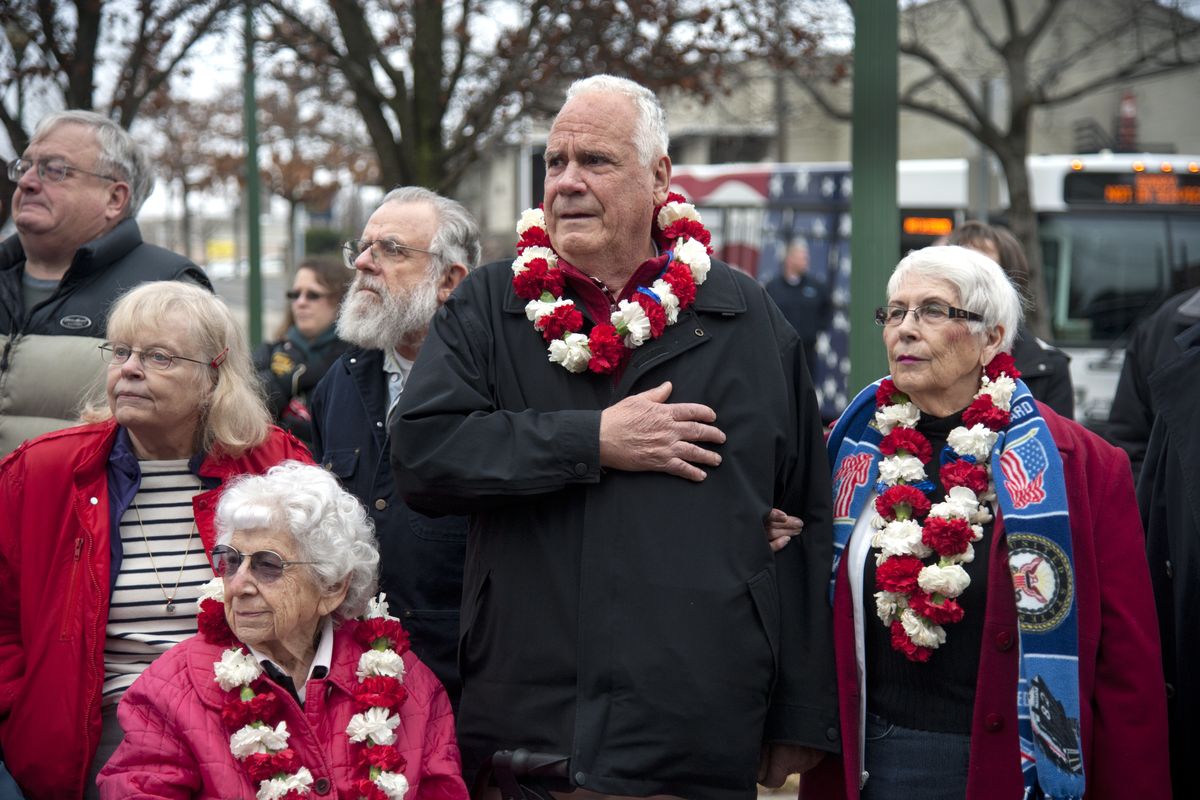Pearl Harbor survivor’s story comes to end

I loved to listen to her talk.
Though soft-spoken, Betty Schott, 98, had a sharp mind and an even sharper sense of humor. She smiled easily, laughed often, and called me “honey.”
But when her husband of 76 years died in May 2014, her smile faded and the quips didn’t come as quickly.
Adjusting to life without her beloved wearied her.
On Sunday, Betty died, 80 years and one day from the anniversary of her first date with Warren Schott.
I met the Schotts in 2007 when I interviewed them for my Love Story series. It was the start of a friendship that spanned eight years and immeasurably enriched my life.
From the beginning, a no-nonsense Warren assured me their story was no romantic tale. In fact, all those years ago, when a friend offered to set him up on a blind date with Betty, Warren scoffed, “Don’t do me any favors.”
He was a young sailor, not in the least interested in finding true love. But on July 4, 1935, love found him in the form of a beautiful, petite North Central High School graduate named Betty Forest.
They were married April 2, 1938, at the Wee Kirk O’ the Heather chapel at Forest Lawn Cemetery in Los Angeles.
When I attended their 75th anniversary celebration, Betty quipped, “Well, we got married in a cemetery and honeymooned in Death Valley, so we got all that out of the way!”
But as Pearl Harbor survivors, the Schotts saw more than their share of death.
Warren had been sent to the Naval Air Station at Pearl Harbor shortly after their marriage. Betty was determined to join him and worked until she earned her passage. She arrived on Ford Island in 1939 and they settled into a tiny apartment near Battleship Row.
Their bedroom overlooked the island’s runway, so they were accustomed to noise, but the sounds that woke them on Dec. 7, 1941, were unlike any they’d heard before.
Betty pulled on her robe and looked out the bathroom window. “Warren!” she called, “there’s smoke and fire at the end of the runway.”
Warren went to another window and spotted a plane flying low overhead. “I saw the red balls on the wings of the plane,” he said. “I watched that plane torpedo the USS Utah. I said, ‘Betty, we’re at war!’ ”
While Betty filled fire extinguishers with other civilians in a supply warehouse, Warren had the grim job of pulling the dead and injured from the harbor. The men he pulled out of the water were covered in oil. Afterward, Betty discovered, “They got rid of every towel in my house trying to help clean them up. Finally they took down my kitchen curtains and used them.”
Over the years, they talked about everything, but on one topic Warren remained silent. “He never talked about the people he pulled out of the oily water that morning,” Betty said. “Never.”
It was often painful for them to share their memories. “Slamming a door for days after the attack would make you jump,” Betty said, recalling the terrible noise and confusion they experienced.
But the Schotts felt it was their duty to tell their story and to honor those who died that day.
Though they didn’t think their 76-year marriage was anything remarkable, they were tickled that their story was included in “War Bonds: Love Stories From the Greatest Generation.”
When I visited with Betty in December while working on a story about the 73rd anniversary of Pearl Harbor, I returned some photos she’d let me use for the book.
She reached up and patted my cheek with her soft, timeworn hand. “I’m so proud of you, honey,” she said. And it felt like I’d received a blessing from my grandmother.
What I remember most was my last visit to her home – the home Warren had built, the home they’d shared for 65 years.
The plaque I’d seen years earlier still hung in the kitchen. It read, “Happiness is being married to your best friend.”
Warren’s death had left her adrift. She missed him so much, and she swore sometimes she could still see him sitting in his chair. She’d blink or turn her head and he’d be gone, but his presence was so real to her, his voice so compelling. Her own voice quavered when she said, “Every night at 11 p.m., he’d say, ‘Honey, now it’s time to go to bed.’ ”
That’s why I would not be at all surprised if on Sunday morning, Betty heard him whisper, “Honey, now it’s time to come on home.”
And of course she went to him. How could she not? She said, “He’s been my best friend for 77 years.”